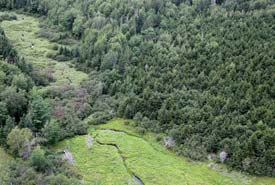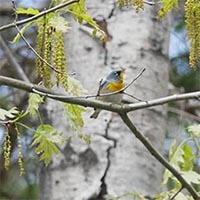Restoring Atlantic Canada’s forests

Docherty's Brook, NS (Photo by Mike Dembeck)
Forest restoration takes time and commitment. It can take four years to go from finding an acorn to planting a sapling. But future generations will see the fruits of this labour when those saplings are supporting songbirds and forest life.
In June 2021, the United Nations kicked off the Decade on Ecosystem Restoration. We can all do our part to help Atlantic Canada’s majestic forests.
Forests do so much to protect our planet and well-being, but they need our help. Due to years of harmful human interference, only about one-fifth of the world’s original forests remain. In the Maritimes, less than five per cent of the original Acadian forest remains. But you can help protect and repair these forests.
A healthy forest offers shelter and food for animals, insects and other plants. It also provides people with jobs and places for recreation, and helps to improve our mental health. Forests clean the air we breathe and absorb the carbon emissions that contribute to climate change. They filter the water we use for drinking, cooking and bathing, and provide wood, paper, food and medicine.
The two main types of forests in Atlantic Canada are Acadian and boreal forest.
The challenges facing our forests
For centuries, Atlantic Canada’s forests have been divided and changed by human activity, such as by roads and agriculture. They are also threatened by invasive species, which cause habitat loss. One of the greatest risks our woodlands face today is climate change. Together, these threats weaken the forests’ resilience and increase the extinction rate of native plants and animals.
With planning and hard work, forest restoration can reduce the effects of human activity, invasive species and climate change.
Together, we can restore Atlantic Canada’s forests.
On-the-ground impact
You can help support a three-year plan to retore nearly 300 hectares (740 acres) of woodlands in Atlantic Canada. The plan focuses on the Miramichi River area, Bay of Fundy, Avalon Peninsula, Northumberland Strait, Southwestern Nova Scotia and Prince Edward Island.
With your support, the Nature Conservancy of Canada (NCC) will undertake several actions to repair and restore Atlantic Canada’s forests:
- Forest restoration plans will be developed for new protected areas and updating existing plans to help prioritize restoration work and manage woodlands for the long term.
- Invasive species that cause habitat loss will be identified, removed and disposed of safely to avoid further spread to healthy forests.
- Unused forestry roads and agricultural fields currently dividing the forest will be removed and restored to forest once more.
- Several different species of native trees will be planted to match the Acadian forest in the Maritimes and the boreal forest in Newfoundland and Labrador.
Be part of the story
Your gift will help to make the forests stronger and build a visible legacy for future generations.
To support this work, please contact Meghan at 1-877-231-4400 ext. 3205 or atlantic@natureconservancy.ca.

Northern parula warbler, Barachois, NB (Photo by NCC)
Members of the NCC team go the extra mile for forest restoration. Keeping acorns in their fridge to prepare them for the spring and then protecting the saplings from local squirrels as they get ready for planting in the wild. "It's all worth it when I see songbirds, like the northern parula warbler, in a forest we're restoring because I know this gives them a chance to continue to thrive here," says Allison Patrick, NCC conservation biologist.




